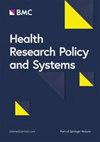Politics–evidence conflict in national health policy making in Africa: a scoping review
IF 3.6
2区 医学
Q1 HEALTH POLICY & SERVICES
引用次数: 0
Abstract
Generally, public health policy-making is hardly a linear process and is characterized by interactions among politicians, institutions, researchers, technocrats and practitioners from diverse fields, as well as brokers, interest groups, financiers and a gamut of other actors. Meanwhile, most public health policies and systems in Africa appear to be built loosely on technical and scientific evidence, but with high political systems and ideologies. While studies on national health policies in Africa are growing, there seems to be inadequate evidence mapping on common themes and concepts across existing literature. The study seeks to explore the extent and type of evidence that exist on the conflict between politics and scientific evidence in the national health policy-making processes in Africa. A thorough literature search was done in PubMed, Cochrane Library, ScienceDirect, Dimensions, Taylor and Francis, Chicago Journals, Emerald Insight, JSTOR and Google Scholar. In total, 43 peer-reviewed articles were eligible and used for this review. We found that the conflicts to evidence usage in policy-making include competing interests and lack of commitment; global policy goals, interest/influence, power imbalance and funding, morals; and evidence-based approaches, self-sufficiency, collaboration among actors, policy priorities and existing structures. Barriers to the health policy process include fragmentation among actors, poor advocacy, lack of clarity on the agenda, inadequate evidence, inadequate consultation and corruption. The impact of the politics–evidence conflict includes policy agenda abrogation, suboptimal policy development success and policy implementation inadequacies. We report that political interests in most cases influence policy-makers and other stakeholders to prioritize financial gains over the use of research evidence to policy goals and targets. This situation has the tendency for inadequate health policies with poor implementation gaps. Addressing these issues requires incorporating relevant evidence into health policies, making strong leadership, effective governance and a commitment to public health.非洲国家卫生政策制定中的政治-证据冲突:范围界定审查
一般来说,公共卫生政策的制定很难说是一个线性过程,其特点是政治家、机构、研究人员、技术官僚和来自不同领域的从业人员,以及经纪人、利益集团、金融家和一系列其他行为者之间的互动。与此同时,非洲的大多数公共卫生政策和系统似乎都是在松散的技术和科学证据基础上建立起来的,但却有着高度的政治制度和意识形态。虽然对非洲国家卫生政策的研究在不断增加,但现有文献中关于共同主题和概念的证据似乎并不充分。本研究旨在探讨非洲国家卫生政策制定过程中政治与科学证据之间冲突的程度和证据类型。我们在 PubMed、Cochrane Library、ScienceDirect、Dimensions、Taylor and Francis、Chicago Journals、Emerald Insight、JSTOR 和 Google Scholar 上进行了全面的文献检索。共有 43 篇经同行评审的文章符合条件并被用于本次综述。我们发现,在决策中使用证据的冲突包括利益冲突和缺乏承诺;全球政策目标、利益/影响力、权力不平衡和资金、道德;以及基于证据的方法、自给自足、参与者之间的合作、政策优先级和现有结构。卫生政策进程的障碍包括行为体之间各自为政、宣传不力、议程不明确、证据不足、协商不充分和腐败。政治-证据冲突的影响包括政策议程被废除、政策制定不尽人意以及政策执行不力。我们报告说,在大多数情况下,政治利益会影响政策制定者和其他利益相关者优先考虑经济收益,而不是利用研究证据来实现政策目标和指标。这种情况容易导致卫生政策不完善,执行不力。要解决这些问题,需要将相关证据纳入卫生政策,需要强有力的领导、有效的治理和对公共卫生的承诺。
本文章由计算机程序翻译,如有差异,请以英文原文为准。
求助全文
约1分钟内获得全文
求助全文
来源期刊

Health Research Policy and Systems
HEALTH POLICY & SERVICES-
CiteScore
7.50
自引率
7.50%
发文量
124
审稿时长
27 weeks
期刊介绍:
Health Research Policy and Systems is an Open Access, peer-reviewed, online journal that aims to provide a platform for the global research community to share their views, findings, insights and successes. Health Research Policy and Systems considers manuscripts that investigate the role of evidence-based health policy and health research systems in ensuring the efficient utilization and application of knowledge to improve health and health equity, especially in developing countries. Research is the foundation for improvements in public health. The problem is that people involved in different areas of research, together with managers and administrators in charge of research entities, do not communicate sufficiently with each other.
 求助内容:
求助内容: 应助结果提醒方式:
应助结果提醒方式:


